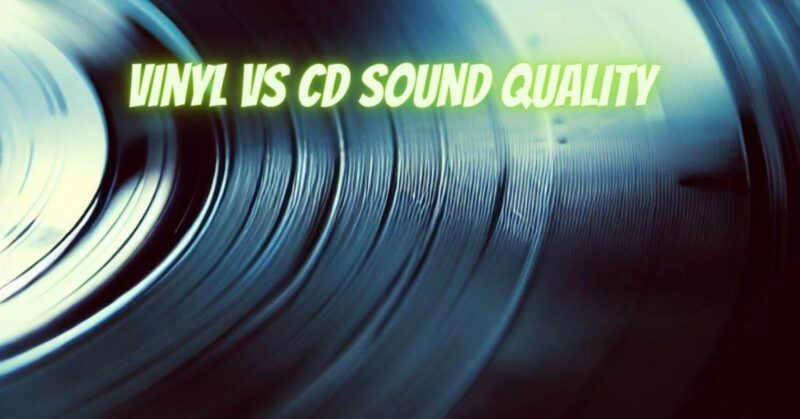In the realm of music appreciation, the debate over sound quality has been a constant topic of discussion. Two prominent contenders in this ongoing contest are vinyl records and compact discs (CDs). Each format has its own unique characteristics, evoking passionate debates among audiophiles, music enthusiasts, and purists alike. In this article, we delve into the world of sound reproduction and examine the factors that differentiate vinyl and CD sound quality, ultimately shedding light on the nuances that make each format special in its own right.
The Warmth of Vinyl:
Vinyl records, a vintage format that has stood the test of time, have captured the hearts of many audiophiles for their warm, analog sound quality. The process of creating vinyl records involves physically cutting grooves onto a master disc, capturing the nuances of the original recording directly. When the stylus glides through these grooves, the resulting analog signal is then amplified to produce sound.
One of the hallmarks of vinyl sound is its warmth and richness. The analog nature of the format allows for a more natural representation of sound, with subtle variations and imperfections preserved. This adds a certain organic charm to the listening experience, often compared to the sensation of being present during the recording session.
Furthermore, vinyl enthusiasts argue that the tactile ritual of handling and playing records contributes to a deeper connection with the music, turning the act of listening into a sensory experience beyond the auditory.
The Precision of CDs:
Compact discs, introduced in the 1980s, revolutionized the way music was stored and played. CDs utilize digital technology, encoding audio data as a series of 0s and 1s, which are then read by a laser to recreate the audio signal. This process allows for precise and accurate reproduction of the original recording.
Advocates of CDs emphasize their inherent fidelity, claiming that digital sound is more accurate and immune to the degradation and wear that vinyl records may experience over time. The absence of surface noise and imperfections often associated with vinyl is a significant selling point for CDs.
Additionally, the compact size and durability of CDs made them a convenient alternative to vinyl, with the added ability to skip tracks and easily access specific parts of a recording.
Subjective Listening Experience:
When comparing vinyl and CD sound quality, it is crucial to recognize that individual preferences play a pivotal role. While some listeners prefer the nostalgic charm and warmth of vinyl, others lean toward the clean, precise sound of CDs.
Audiophiles often invest in high-end audio equipment and meticulously engineered setups to maximize the sonic potential of their chosen format. Factors such as the quality of the recording, mastering, playback equipment, and the listening environment can all influence the perception of sound quality.
Additionally, our psychological biases can color our judgments. Listeners’ expectations, preconceptions, and emotional connections to a particular format or music genre may unconsciously influence their assessment of sound quality.
The vinyl versus CD sound quality debate is more than a matter of technical specifications; it is a realm where art and science converge, and personal preferences take center stage. Both vinyl records and CDs have their unique merits, and enthusiasts on both sides passionately argue for their format of choice.
Ultimately, the allure of vinyl’s warmth and analog charm will continue to captivate those seeking a nostalgic and tactile listening experience. On the other hand, CDs offer a more pristine and accurate representation of the original recording, appealing to those with a preference for technical fidelity.
In the end, whether it’s the captivating crackle of vinyl or the crystal-clear tones of CDs, what truly matters is the profound emotional connection that music creates, transcending the medium through which it is conveyed.


